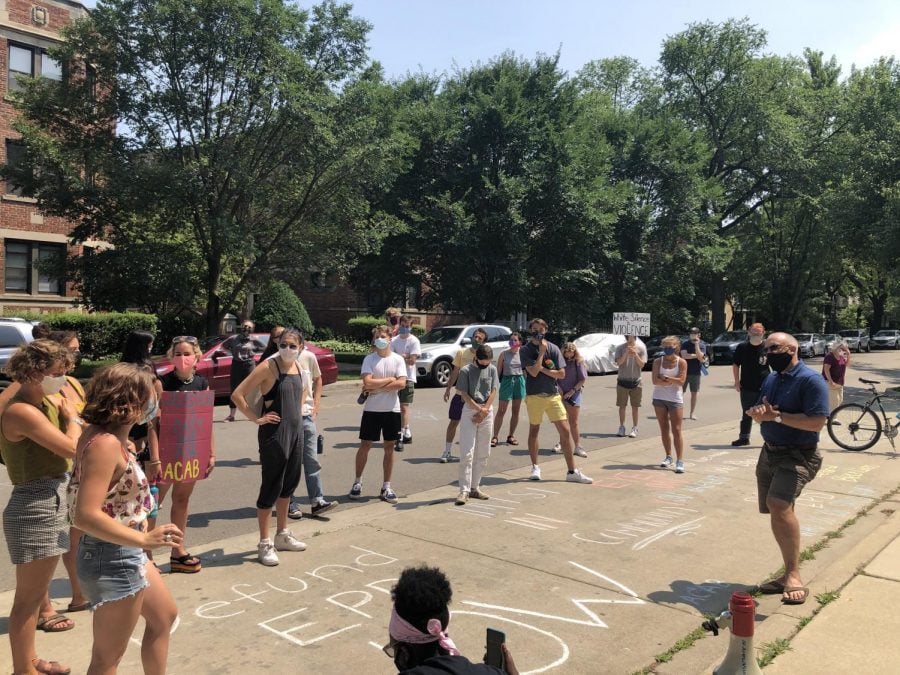Year in review: Around town
Daily file photo by James Pollard
Mayor Steve Hagerty talks with protesters outside the Lorraine H. Morton Civic Center about defunding Evanston Police Department in July. Residents and activists have staged a number of protests surrounding the Black Lives Matter movement and defunding the police.
August 16, 2020
In your time at Northwestern, you’ll become intimately familiar with Evanston, a bustling city whose downtown is just a few minutes from campus. Staying up-to-date will help make your experience with the city — and Chicago, a few miles down the shoreline — a little better. Here are the biggest stories from Evanston over the past year.
COVID-19
Like everywhere else in the country, the COVID-19 pandemic hit Evanston in a whirlwind, as students were finishing up Winter Quarter classes. In mid-March, Mayor Steve Hagerty declared a local state of emergency as cases in the state grew higher, and the city’s first death occurred in a nursing home, where residents are among the demographics most likely to face complications from the disease.
Early data from the city showed that black residents are disproportionately affected by the virus. Based on data from the early months of the virus, black residents made up 34 percent of cases, though they comprised only 16.6 percent of the population.
[Read more about how black residents have been disproportionately affected by COVID-19]
The city has also faced anti-Asian racism, up to $20 million in lost revenue and struggles with potential undercounts in the 2020 census. Despite the uncertainty and rapidly evolving situation at the beginning of the pandemic, the city has managed to decrease its positivity rate.
Evanston resident and icon Hecky Powell, owner of Hecky’s Barbecue and champion of Evanston youth, died from COVID-19 complications in May. He is remembered for his philanthropy, generosity and, of course, his barbecue sauce.
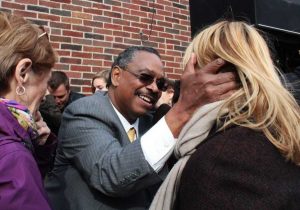
The movement for racial justice
Evanston residents also took part, and continue to take part, in the nationwide Black Lives Matter movement, which calls for racial justice and defunding the police.
Evanston officials made the historic decision to create a reparations fund to address institutional disenfranchisement of the city’s black residents in Nov. 2019, and talks about how these reparations could be implemented continued through the summer. Some potential implementations could be housing assistance and loan forgiveness for black residents affected by discriminatory practices.
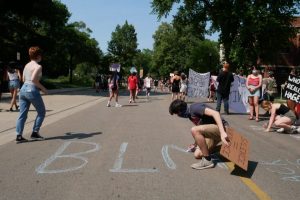
In the summer, residents took to — and painted — the streets in support of defunding the Evanston Police Department. The mayor held a series of virtual Q&As about Evanston’s police force, with discussions ranging from the use of policing in schools to the EPD budget. Activists, many of whom are young residents, staged sit-ins outside of aldermen’s homes during a City Council meeting and hosted several other protests throughout June and July. Several aldermen have come out in support of defunding the police.
[LISTEN: The women behind Evanston Fight for Black Lives]
Cannabis legalization
On Jan. 1, Illinois legalized recreational cannabis up to 30 grams for those over the age of 21. But with some restrictions, social equity advocates had concerns about who could legally smoke and who couldn’t. Regardless, the industry has been successful, even topping the state’s expectations for revenue.
In addition, the city has come up with a unique use for its cannabis tax: funding reparations.
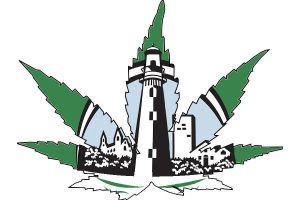
Elections
Former Vice President Joe Biden secured a win in the Democratic primary in Illinois and in suburban Cook County, specifically. The city, however, had issues getting enough cleaning supplies to polling places, and polling locations around Cook County faced staffing issues as people dropped out or didn’t show up due to COVID-19 concerns.
Some residents still remain skeptical about voting in the general election in November. Earlier this year, before COVID-19 reached the city, residents went out-of-state to support their favorite candidates, citing Illinois’ reliable Democratic record to focus attention elsewhere.

Caption: The 2020 Democratic race began with the most diverse group of candidates in the nation’s history. Former Vice President Joe Biden would be the one to clinch the primary.
An Illinois law was also passed this year giving students up to two hours off from school to vote.
Business struggles and successes
Andy’s Frozen Custard. Panera Bread. Barnes & Noble. All of these Northwestern student staples closed in downtown Evanston this year, along with a number of smaller, local businesses, including Market Fresh Books, boutique Coucou & Olive and Williams Shoes the Walking Spirit.

Independent businesses in Evanston have suffered recently due to competition from chains, increased parking fees, high rent and online shopping, among other issues. The pandemic has also exacerbated economic problems, with many small businesses unable to receive government loans.
[In depth: The big fight to shop small]
Despite businesses suffering, there have also been several successes. Reza’s Restaurant brings Persian cuisine to downtown Evanston in Pete Miller’s former location. Newport Coffee House and Backlot Coffee both opened over the past year in downtown Evanston. And if you’re looking for hidden gems just a few minutes from campus, the Main-Dempster Mile is the place to go.
Fights against climate change
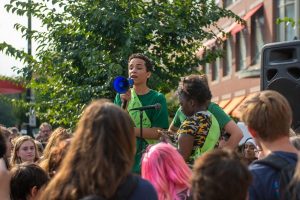
As climate change becomes an increasing threat, high school students took matters into their own hands, petitioning City Council to take more action on climate change and, earlier in the academic year, joining a September global climate strike. Climate change’s threats to the Chicago area include increased heat waves and more intense bursts of precipitation, according to scientists who study the issue.
[In depth: How climate change can affect Evanston’s sewers]
The implementers of the city’s Climate Action and Resilience Plan praised outreach as its major success one year after adoption as businesses and residents came together to tackle the plan’s ambitious goals, including 100 percent renewable energy by 2030.
School shakeups
Two school districts call Evanston home: Evanston/Skokie School District 65 and Evanston Township High School District 202. Both will be starting off the school year remotely, but for some parents with at-risk students, no back-to-school options are good ones. Online changes have been particularly frustrating for ETHS students who took remote Advanced Placement tests, citing timing difficulties with the shorter, 45-minute test and struggles submitting the exam online.
In January, a District 65 accountability report found opportunity gaps still persist between black and white students, with, for example, 83 percent of white students meeting or exceeding English language arts college readiness benchmarks, compared with just 33 percent of black students. The district’s new superintendent, Devon Horton, hopes to address this gap, however. An ETHS report from November also revealed racial success disparities, with white students having an average GPA of 3.4, compared to a 2.6 for black female students and a 2.3 for black male students.
[In depth: A look at one teacher’s fight against transgender discrimination]
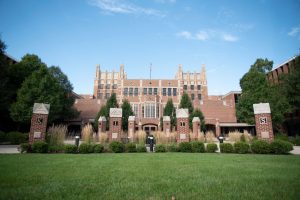
Email: [email protected]
Twitter: @emmaeedmund
Related Stories:
— When your house is not a home: domestic violence in Chicago amid a pandemic
